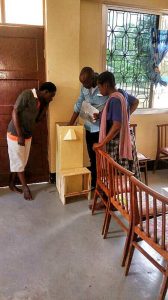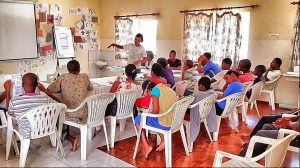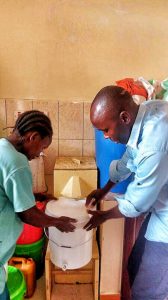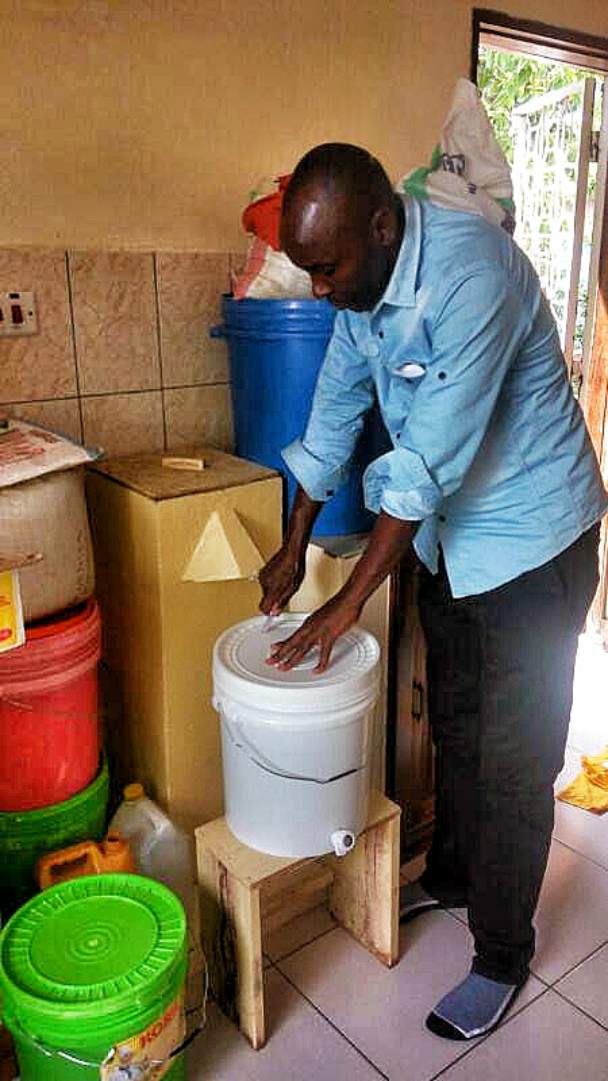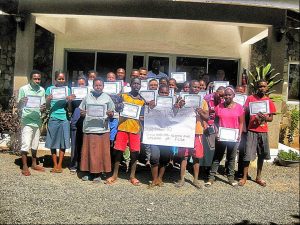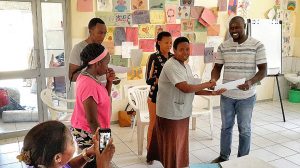This project is made possible through the partnership of WATER CHARITY and the NATIONAL PEACE CORPS ASSOCIATION, working with Friendly Water for the World. ![]()
This project has been completed. To read about the conclusion, scroll down below.
Village of Hope – Nyegezi, Mwanza, Tanzania
Community Description
Village of Hope is a care center for children located at Nyegezi ward in Mwanza region. Mwanza is a mid-sized port city on the southern shores of Lake Victoria in northwestern Tanzania. With a population of over 700,000, it is Tanzania’s second-largest city, following Dar es Salaam. Mwanza is the capital of the surrounding Mwanza Region.
Problem Addressed
The Village of Hope care center provides all the basic needs of children and youth, such as housing, food, education, health care and so on. Children are brought to the center at different age stages, but once they reach 18 years old, they get sent back to their family or community. Some of the kids have no family to be sent to, but they have a good chance to start a new life independently because of the skills they learned at the center.
The center has no reliable source of drinking water, which makes it extremely hard to keep the kids healthy. A big chunk of the center’s income has been spent on charcoal for boiling water. Nonetheless, waterborne diseases such as typhoid, amoeba, and dysentery are common at the center.
Project Description
The idea of a BioSand water filter training project was introduced to the community for the purpose of providing safe and clean water to people in order to reduce water-related diseases. They were enthusiastic 🙂
This project is a WASH and Bio Sand Water Filter Fabrication Training. Projects like this have proven very valuable and deliver high performance and profound effects in many areas of lesser developed countries like Tanzania, where access to safe water is still a problem. Improvement of people’s health is the major outcome, and there is a rise in the living standards of people who are engaged in these projects. New employment opportunities are another impact in Tanzania. Approximately 200 group members who have been trained so far, are now employed under this project through fabrication, selling water and selling filters to earn income.
This project to provide training on the making and maintaining of BioSand Water Filters to 28 members of the center will have a similar benefit. The operation will not only provide continuous and reliable access to clean drinking water but it will also provide a source of income to the center through the sale of drinking water and filters in the community.
Community Organizations
This training is a collaboration of Water Charity, Friendly Water, CLAO and Village of Hope.
Community Life Amelioration Organization (CLAO) is the local organization (initiated by Tanzanian) registered under the nongovernmental Organization act, 2002 (registration no 00NGO/0008807) with the aim to implement bio-sand water filter projects in Tanzania with Friendly Water For The World. CLAO will be working with the community at the grassroots level in different projects initiated to raise community well-being economically, socially and in terms of health. Under this project, CLAO will organize the training, do preparation for all other requirements of
the training, and conduct the training, monitor and evaluate the project’s progress.
Our vision is “to see a sustainable community where everyone has a decent and contented life”
Mission
“Fostering rational utilization of skills and manpower for sustainable development in both social and economic spheres as well as creating friendly environment in order to ensure diversity sources of income and improve livelihoods of communities.
Village of Hope (VOH) is a nonprofit organization that exists for the sole purpose of bringing hope to vulnerable children in Mwanza. They try to accomplish this by providing vulnerable children with shelter, education, healthcare, and nutrition. They are currently serving over 300 children through their children’s homes and schools.
Vision
The vision of Village of Hope-Mwanza is that all children are loved and care for.Mission
Village of Hope-Mwanza exists to bring lasting hope to the children at risk so they can embrace adulthood as independent and contributing members of the society.
Village of Hope-Mwanza came to exist due to stories of children, including abandonment and death of one or both parents. Many of the children were found abandoned in a certain area and brought to police and then to social welfare, which brought them to VOH. A few stories involve the death of both parents and family being unable to care for the child. In some cases, the mother died at birth and no family was available.
Children are raised at the center until the age of 18 years, then released back to society to start an independent life. It becomes a challenge for them to cope with community life, as some of them do not even know their relatives. They often have no life skills, apart from the home-based education that they have received during years spent in VOH.
Each year, numbers of youth complete their secondary education with no hope for further studies, hence becoming a burden to society or engaging in adverse psychosocial behaviors.
Project Impact
More than 300 children living at the Village of Hope-Mwanza and more than 30 workers employed with VOH will gain access to safe and clean water. Trained youth will become employed, enabling them to earn income and benefit the community.
Volunteer Directing Project
Julius Kenyamanyara
Monitoring and Maintenance
Community Life Amelioration Organization (CLAO) in collaboration with Village of Hope-Mwanza (VOH) will monitor the progress of the project, whereby selected leaders from the group will collaborate on providing progress report and share groups information.
Sustainability;
-Entrepreneurship and marketing skills will be taught as part of the training to provide members with techniques on the selling filters.
-VOH will be responsible to advertise and find other donors to support the group.
-VOH should contact their partners to introduce them to the project hence more training is expected in the future in partnership with FWFW and CLAO.
Expected Outcomes:
Short-term
- Equip group members with the knowledge and skills on fabrication and installation of bio-sand water filter
- Capacity building on water, hygiene and sanitation education to group members
- Provision of safe and clean water to the VOH community
- Employment opportunity
Long-term
- Improve the living standard of the group members and families in general
- Reduction of water-borne diseases as more people will be using bio-sand water filters
- Health improvement
Village of Hope, Tanzania – Training Concluded!
The training was conducted and was a tremendous success. Many filters were constructed and the knowledge that the certified trainees gained has already been passed along throughout the area. The additional income generated for Village Of Hope is allowing them to expand their reach and aid even more children there.
A group of 28 people has trained: 24 youths, 2 teachers and, and 2 house women.
At the end of the training, all the participants received a certificate, that proves their capability in making and maintaining the BioSand Water Filter as well as the basics of hygiene and sanitation.
Outcomes:
– More than 300 beneficiaries in the Village of Hope center now have safe and clean drinking water, and the surrounding community also benefits from the project. Members of the village of hope are designated to educate people on the importance of using safe clean water. This will also increase the sale of filters.
– Improvement of the living standard of the group. The operation is making filters for the center and for the community. The BioSand filter is in high demand, and people buy them from the center.
– In the long run the center is projecting to be trained on the making of rainwater catchment systems to have a readily available source of water.
Up to date the group made and installed 139 filters. The center management has purchased 31 filters for all the workers at the center to be installed in their households. The center is proceeding to make filters for the surrounding community. The group has also recently received an order of 7 filters from the neighboring village of Bugarika.
The Village of Hope has a goal of making 200 filters by the end of the year, which will serve about 1,400 people.
UPDATE: They have already surpassed their goal, and continue to expand this very successful operation. Who can say how many people will drink water free of microbes due to this project in the long run…
This project has been paid for through the generosity of an anonymous donor.
